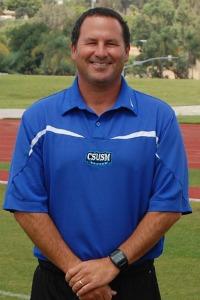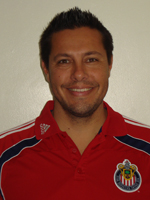The Importance, Role and Responsibility of Being a Youth Soccer Coach in America
In a continuing series on the role of a youth soccer coach, with Michael Duggan, Director of Coaching for Carlsbad United Soccer Club, Marc Gomez, U-9 and U-10 coach for the now disbanded Chivas USA Youth Academy, and Ron Pulvers, head men’s and women’s soccer coach for California State University, San Marcos.

Part 1: The Role of Being a Youth Soccer Coach with Paul Caligiuri and Shannon MacMillan
Part 2: The Role of Being a Youth Soccer Coach with Alberto “AB” Bru, Colin Chesters and Christian Lavers
Part 4: The Role of Being a Youth Soccer Coach with Steve Hoffman and Wayne Harrison
|
|
Diane Scavuzzo talks with top coaches about the important position of a coach. Youth soccer coaches have great influence over their players, and the best ones take this responsibility very seriously. As America works to develop home grown players, the role of the youth soccer coach is more important than ever.
Diane Scavuzzo: What is the importance of being a soccer coach?
Michael Duggan: Being a soccer coach is a privilege and a great responsibility. We are entrusted with being the best role models we can be.
Our job is to have a positive impact with the players we are working with and to give them some of the most enjoyable memories to look back on for the rest of their lives. Hopefully one day when they become coaches, you are the one they look back on. What we say and do has a massive influence as they develop into young adults.
Marc Gomez: Being a coach has so many different meanings to me. It’s such an honor to be able to have an opportunity to influence the lives of kids in so many different ways. I coach because I love the game and I am passionate about the game. I coach because of the kids and most importantly I love the chance to be a positive influence on our youth. It’s a role in which I take so much pride and joy in doing, to make a difference.
To be a good coach you have to realize the importance of teaching the fundamentals of the game. You need to be a good role model and have an enormous amount of patience in what you are trying to accomplish with player development. It’s important to be organized with what you’re trying to teach and being clear on what your goals are.
Ron Pulvers: I believe that the role of a coach is in multiple domains and depends largely on your audience. First and foremost, a coach must be a teacher. When I was a young coach I remember [former U.S. Men’s National Team coach] Bob Gansler saying, “Soccer coaches are teachers in shorts.” I have never forgotten that. Secondly, a coach needs to understand who they are coaching, that is, the players’ age, gender, level, background and so on. Lastly, a coach must facilitate a fun, safe, and positive environment where learning can be maximized.
Diane Scavuzzo: What are the responsibilities of a coach?
Ron Pulvers: A coach has many responsibilities. Perhaps most importantly, a coach must be a positive role model. A coach must create a learning environment where the game is the teacher, where problem solving through the game is experienced and developed. A coach must have command of the subject matter. Finally, and very importantly, a coach needs to listen to his or her players, be committed to professional development, and always be learning.
|
|
Michael Duggan: Our responsibility is to find a way to motivate every player, to start with a plan and to do all we can to reach our goals, We need to remind ourselves that the game is for the players. We have to show them how and then allow them to play with freedom. Above all we need to let them know when they have done a great job. One positive comment will make a player’s day. It’s our responsibility to extend ourselves outside the game to help our players reach their personal goals.
A soccer coach has to be able to reach out to all the players and be able to educate them about this beautiful game. Players are not robots – they are all wired in different ways. We are teachers, and our job is to create an environment that is fun as well as instructional. All our players need to understand their roles within the team. We should always be looking to improve ourselves. It’s our responsibility when things are not working on the field to ask ourselves, “What can I do this week at practice to improve our game?” We have to see it, then fix it.
Marc Gomez: There is so much responsibility in coaching; the foundation of not only soccer but life is in your hands as a coach. Having the ability to develop soccer players is just the base work of coaching. Teaching kids sportsmanship, discipline, hard work, what it’s like to be part of a team and how much heart and determination it takes to be successful are just a few of the many responsibilities of a coach. In many ways a coach is a teacher, counselor, parent and at moments a friend or mentor.
Coaches inspire player development by cultivating each player’s love and passion for the game. Players are developed in an environment that encourages creativity by way of each player’s natural abilities, without the fear of failing. It is not only the players who should display passion and love for the game. It is that same love and passion of the game from the coach that inspires player development.
It is the trust between the player and coach and that special working relationship that promotes player development. Having a clear understanding of what the needs of each player are will help promote development. As much as player development is hard work, it must be fun. Creating a hard-working and fun atmosphere will speed up the learning process of players.
Diane Scavuzzo: What other thoughts would you like to share on coaching?
|
|
Marc Gomez: I was inspired to coach after watching my father coach for so many years. The effect my father had and the relationships he built through coaching young athletes is what made me want to be a coach. Unfortunately I was not blessed with having a good coach as a kid. I was driven to make sure that kids are given the opportunities to develop and learn the game, opportunities I did not have.
Coaching isn’t something that you can just have or that is given to you; coaching is earned. It is a privilege to mold the future of our sport. It is and always should be an honor to work with children, an honor to be called a coach.
Michael Duggan: Always remember that as a coach, communication is the key. Be honest and always ethical. The more you give of yourself the more rewards you will see. This is the greatest game in the world, both as a player and as a coach. My personal love for the game has not faded in 45 years, and I still look back to some of my fondest memories that playing this game has given me. I just recently returned from an annual trip to Las Vegas where over 40 of my school soccer friends and adult soccer teammates from England all got together to look back on some of the greatest days we have had.
Ron Pulvers: I am sometimes asked how I got involved in coaching. Of course, mostly it was for the love of the game, and staying around soccer and giving back what the game had given me. As a college player, I was heavily influenced by my college coaches Jimmy Millinder at El Camino College (now women’s coach at the University of San Francisco) and Dave Wolf at Westmont College.
These coaches were incredible role models and positively influenced my life in so many ways. I wanted to have a similar effect on players. It is all about relationships, life lessons and building good character qualities through the game of soccer. Additionally, the lifestyle they led was something that really appealed to me.
Marc Gomez: There are many challenges in coaching soccer, such as different levels of talent, different player backgrounds, and the player’s parents. Convincing parents to let their child shine his or her own light and be their own person is not easy. Every parent wants their kid to be the next great soccer player, but not every kid will be. Not every player has the same level of talent, nor does he or she have the same upbringing.
It is the coach’s role to make sure that each kid’s needs are met within a positive and structured environment, one which allows for maximum player development. When players don’t achieve their goals, it brings disappointment to me as a coach. Coaches are their own worst critics. You always ask yourself if you did enough for each player; this in many ways is the biggest challenge of coaching.









